外研社 八年级上册 Module 5 知识点
外研版八年级上册Module 5知识点整理

外研版八年级上册Module 5知识点整理一.重点短语1.in the end最后,终于2.be famous for因……而出名”3.would like想要4.the beginning of……的开头5.send sb. to sp.把某人送到某地6.be named被命名为……7.give a warm welcome to热情欢迎……8.take place发生9. no idea 不知道二.用法集萃1.want to do sth.想要做某事2.offer to do sth.主动提出做某事3.plan to do sth.计划/打算做某事4.hope to do sth.希望做某事5.Let’s do sth.让我们做某事吧。
6.Why don't we do sth?我们为什么不做某事呢?7.make sb./sth.+adj.使某人/某物处于……状态8.It is +adj. +to do sth.做某事是……的.三.重点句型1.Lingling offered to take me there.玲玲提议带我去那儿.2.He’s especially famous for his play Teahouse.他尤其以他的话剧«茶馆»而著名。
3.Teahouse is one of Lao She’s most famous plays.«茶馆»是老舍最著名的话剧之一。
o She Teahouse gives a warm welcome to everyone from all over the world.老舍茶馆热情欢迎来自世界各地的人们.四.语法归纳:(一)动词不定式作宾语(二)双宾语教材中含有动词不定式的句子:1.You know, I wanted to see the Beijing Opera.你知道,我想看京剧。
2.Lingling offered to take me there.玲玲提议带我去那儿。
外研版八年级上册 Module5 知识点总结+练习 (无答案)

Module 5 Lao She Teahouse1. You know, I wanted to see the Beijing Opera, so Lingling offered to take me there.你知道的,我想看京剧,所以玲玲主动提出带我去那里。
【点拨】(1)want是动词,意为“想;想要”。
常用于以下结构:1)want sth.想要某物。
2)want to do sth.想要做某事。
3)want sb. to do sth.想要某人做某事。
(2)offer:动词,意为“提议,提出”,常用结构为:offer sb sth =offer sth to sb 意为“向某人提供某物”offer to do sth意为“试图/提议/主动去做某事”The young man offered the old man his own seat on the bus .那个年轻人在公共汽车上将自己的座位让给了那个老人。
【辨析】provide与offerprovide指有远见,为应付意外、紧急情况等做好充分准备,可用于provide sb with sth或provide sth for sbThey provided us with all the books we need .他们为我们提供所需要的所有书籍。
offer 侧重表示“愿意给予”,常用于offer sb sth 或offer to do sth 结构She offered me a cup of tea .【中考链接】(2018深圳中考)-Jack __________ to help at the underground station on Saturdays .-Cool ! Let’s join him next Saturday .A. offersB. refusesC. forgets2.But the actors and actresses were excellent .actress 名词意为女演员,actor 意为男演员【考点拓展】(1)act 做名词,意为“(戏剧、歌剧或芭蕾舞的)一幕”The funnies part is the second act of the play .(2)act 做动词,意为“行动,表现”等,action做名词,意为“行动,行为”3. We only planned to watch for an hour, but in the end, we stayed for three hours.我们只打算看一个小时,但最后我们待了三个小时。
外研版英语八年级上册Module 5单元知识点归纳总结(详细版)

Module 5一.重点短语:1.主要的事情2.不知道3.主动提出做---- 给某人提供、提议什么4.带某人去-----5.最后6.下次7.因---以---对谁--而出名8.在中国社会9. 平民老百姓的生活10.从19世纪末到二十世纪中期11.把某人送到某地12.毕业后13. 回到中国14.被称为---15.在老舍茶馆16.热情欢迎---17.发生18.中国最伟大的作家之一19.二十世纪前半期20.思考社会21.一个很好的选择22.对---正合适,适合于---23.把---演的活灵活现,演的逼真24.表现的相当出色,做的很棒25.茶馆的主人26.同时27.现代中国28.对人们的生活了解了许多29.大约公元前600年1.the main thing2.have no idea3.offer to do sth offer sb sth =offer sth to sb4.take sb to some place5.at last/in the end6.next time7.be famous for ---as ---to sb8.in Chinese society 9.the lives of common people10.from the end of the nineteenth century to the middle of the twentieth century11.send sb to ---12.after finishing school13.return to China =come /go back to China14.be named ---15.at Lao She Teahouse 16.give a welcome to sb 17.take place18.one of China’s greatest writers 19.the first half of the twentieth century20.think about society 21.a very good choice22.be right for ---23.bring----to life 24.do a very good job25.the owner of the teahouse 26.at the same time27.modern china 28.learn a lot about people’s lives29.around 600BC三重点句型1.我想看京剧所以玲玲主动提出带我去那里2.京剧的戏词很难懂,但男演员和女演员很棒。
(完整)外研版八年级英语上册Module5知识点总结,推荐文档

外研版八年级上册Module 5 知识点归纳一.短语强记drink tea 喝茶,in the end最后,main thing主要的事情,next time下次,no idea 不知道,be famous for因……而闻名,would like想要,one of… ……之一,common people普通人,the end of the nineteenth century 19世纪末,send…to 把……送到……,return to回到……,be named被命名为,the People’s Art ist人民艺术家,magic shows魔术表演,give a warm welcome to 热烈欢迎……,take place 发生,think about考虑,at the end of 在……末尾,have a great time过得愉快,at the same time同时二.知识点解析1. actress n. 女演员actor n.男演员2.want to do sth是主语某人自己想要做某事;want sb to do sth是主语某人想要让另外一人做某事want to______the Beijing Opera想去看京剧3.offer① offer sth. 主动提供某物,offer_____ ______提供一些建议② offer sb. sth.=offer sth. to sb. 给某人提供某物,offer a good job___him给他提供一份好工作③ offer to do sth. 主动提出做某事,offer ___ ____ me主动帮助我4.hope to do sth.希望做某事5.agree to do sth.同意做某事6.take…to…带某人或某物去某地,后接地点副词,to可以省略。
take me there7.in the end 最后,终于,相当于finally或at lastat the end of …在…的末尾,在…的尽头, at the _____ of the road8.No idea=I have no idea./ I don’t know.9.be famous for 因……闻名,Lao She is famous ______his play teahouse.be famous as 作为……而闻名, Lao She is famous ______a great writer.10.show①“展示;显示;给……看” show sb. sth.或show sth. to sb.给某人看或者展示某物,show me a book= show a book____me,注意:“show it(them) to sb.”结构。
八年级上册英语外研M5知识点
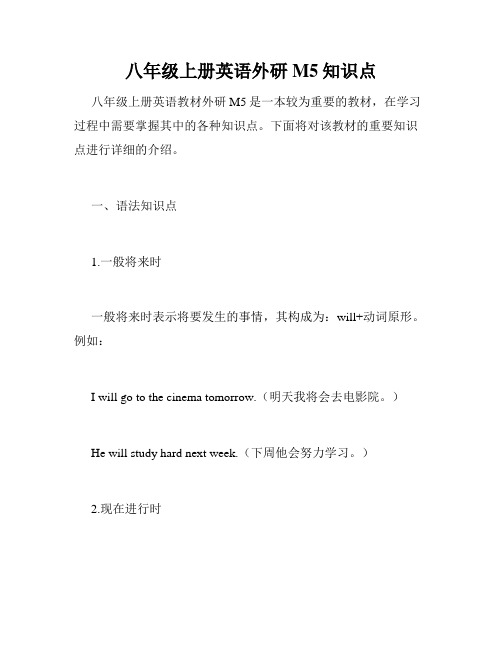
八年级上册英语外研M5知识点八年级上册英语教材外研M5是一本较为重要的教材,在学习过程中需要掌握其中的各种知识点。
下面将对该教材的重要知识点进行详细的介绍。
一、语法知识点1.一般将来时一般将来时表示将要发生的事情,其构成为:will+动词原形。
例如:I will go to the cinema tomorrow.(明天我将会去电影院。
)He will study hard next week.(下周他会努力学习。
)2.现在进行时现在进行时表示现在正在进行的事情,其构成为:am/is/are+现在分词。
例如:I am studying English now.(我正在学习英语。
)They are playing basketball at the playground.(他们正在操场上打篮球。
)3.形容词比较级形容词比较级表示两个事物之间的比较,其构成为:原级+er。
例如:Tall --- Taller(高的 --- 更高的)Smart --- Smarter(聪明的 --- 更聪明的)4.情态动词情态动词是用来表达某个动作的可能性、愿望等,包括can、could、may、might、shall、should、will、would、must等。
例如:I can swim very well.(我能游泳。
)She should finish her homework in time.(她应该及时完成作业。
)二、词汇知识点1.时间表达时间表达是重要的词汇知识点,在日常中会经常用到,例如:Monday(星期一)Tuesday(星期二)Wednesday(星期三)Thursday(星期四)Friday(星期五)Saturday(星期六)Sunday(星期日)2.健康健康词汇是重要的日常生活用语,需要掌握,例如:Healthy(健康的)Ill(生病的)Cold(感冒)Headache(头痛)Fever(发烧)三、阅读知识点阅读是英语学习中重要的环节之一。
外研版初二英语八年级Module 5知识点
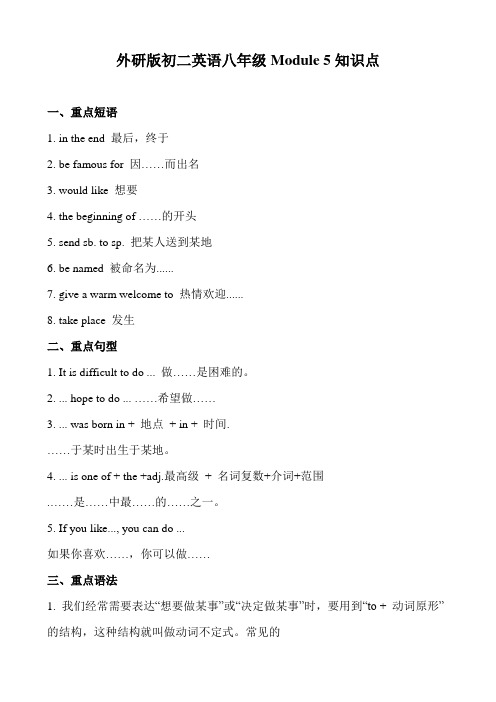
外研版初二英语八年级Module 5知识点一、重点短语1. in the end 最后,终于2. be famous for 因……而出名3. would like 想要4. the beginning of ……的开头5. send sb. to sp. 把某人送到某地6. be named 被命名为......7. give a warm welcome to 热情欢迎......8. take place 发生二、重点句型1. It is difficult to do ... 做……是困难的。
2. ... hope to do ... ……希望做……3. ... was born in + 地点+ in + 时间.……于某时出生于某地。
4. ... is one of + the +adj.最高级+ 名词复数+介词+范围.……是……中最……的……之一。
5. If you like..., you can do ...如果你喜欢……,你可以做……三、重点语法1. 我们经常需要表达“想要做某事”或“决定做某事”时,要用到“to + 动词原形”的结构,这种结构就叫做动词不定式。
常见的后接动词不定式作宾语的动词有:plan, decide, want, agree, try, hope, offer, like, need 等2. 英语中,有些动词可以接两个宾语,即指人的间接宾语和指物的直接宾语,这两个宾语称为“双宾语”。
此类动词常见的有:buy, pass, give, offer, show, bring, send 等。
其句型结构为:主语+动词+间接宾语+直接宾语= 主语+ 动词+ 直接宾语+ 介词(for / to) + 间接宾语注意:当表示物的宾语为代词时,只能使用主语+ 动词+ 直接宾语+ 介词+ 间接宾语”的表达形式。
例如:Can you send it to me as soon as possible?你能尽快把它邮寄给我吗?增强背诵记忆的方法• 勤动手指锻炼手指功能可健脑益智,促进思维。
外研社八年级英语上册Module5知识点

Module 5 Lao She Teahouse一、重点词组1、want to do 想做某事2、offer to do 主动提出做某事3、plan to do 计划做某事4、hope to do 希望做5、the traditional Beijing Opera 传统京剧6、easy/difficult/hard to understand 容易/难理解7、take sb. to sp. 带某人去某处8、in the end 最后,终于9、be famous for 因为…而闻名10、would like to do 想要做某事11、understand the main ideas 理解主旨12、one of the most famous plays 最有名的戏剧之一13、the end of the nineteenth century 十九世纪末14、the middle of the twentieth century二十世纪中期15、People ’s Artist 人民艺术家16、all over the world/around the world 全世界17、take place 发生18、at the same time 同时19、from…to 从...到二、重点句型1、I want to see Beijing Opera.want to do something. 想做某事2、So Lingling offered to take me there.offer to do something 主动提出做某事【拓展】offer 可以做名词,“提议、出价、提供”3、We only planned to watch for an hour.plan to do something 计划做某事4、I hope to under more next time.hope to do something希望做某事5、It was difficult to understand the words.It’s +adj+(for/of sb.)+ to do sth. 对某人来说做某事是怎么样的。
外研版英语八年级上册Module-5知识点及练习题(含答案)

外研版英语八年级上册Module5 Lao She Teahouse 知识点课文知识点1. — Who is Lao She? 老舍是谁?— No idea. 不知道。
这里的No idea 相当于I don’t know。
例如: She has no idea where to go. 她不知道要去哪里。
— Do you know how old our teacher is? — I have no idea. She looks pretty young.2.You know, I wanted to see the Beijing Opera, so Lingling offered to take me there. 你知道,我想看京剧,所以玲玲提议带我去那里。
offer的用法:(1) offer作动词,表示主动提出做某事,后接不定式,至于对方接受或采纳与否不予说明。
如:He offered to lend me his dictionary.他主动要把他的词典借给我。
(2) offer作动词,表示主动提出给与某人某物时,后面可接双宾语。
如:The headmaster offered me her raincoat.校长要把她的雨衣借给我。
(3) offer作动词,还可以表示出价。
They offered him 3,000 yuan for the motorbike.他们提出以3000元的价格买他那辆摩托车。
(4) offer用作名词,意为提议;提供;出价。
如:Thank you for your offer of help.感谢你主动帮忙。
3. My parents agree to on Saturday.我父母同意在周六。
agree的用法小结(1)agree with①表示同意某人或某人的意见、想法、分析、解释等(即持同一观点)。
如:I quite agree with you.我完全同意你的意见。
Module 5 外研版英语八年级上册知识点背诵

Module 5◆重点词汇1.actress n.女演员actor n.男演员2.teahouse n.(尤指亚洲的)茶馆3.offer v.提议;提出offer to do sth.主动提出做某事offer sb.sth.=offer sth.to sb.给某人提供某物4.end n.(时间的)最后一段,末尾v.结束in the end=at last=finally最后;终于at the end of...在……的末端;在……的后期(即可指时间,也可指空间) by the end of...在……之前;到……为止(只表示时间概念)5.act n.(戏剧、歌剧或芭蕾舞的)一幕v.表演6.show v.展示;显示n.演出;表演mon adj.普通的;一般的lives of common people普通人的生活8.twentieth num.第二十the middle of the twentieth century 20世纪中叶9.describe v.描写;描述description n.描述,描写a description of ……的描述10.society n.社会social adj.社会的the changes in Chinese society中国社会的变迁11.college n.大学;学院12.novel n.(长篇)小说 v.给……取名,给……命名be named/called被称为……14.if conj.如果;若15.magic adj.魔术的;戏法的magic shows魔术表演16.main thing重要的事17.no idea不知道18.head teacher 校长19.the People’s Artist人民艺术家20.give a warm welcome to sb.热烈欢迎某人21.all over the world全世界◆重点句型1.You know,I wanted to see the Beijing Opera,so Lingling offered to take me there.你知道的,我想看京剧,因此玲玲主动提出带我去那儿。
外研版八年级英语上册Module 5 知识汇总

外研版八年级英语上册Module 5 知识汇总Module 5 知识梳理【重点短语】1.send/give sb. sth.=send sth. to sb. 发送/给某人某物2.every/each(每个)+V单数3.tired 累的(人)tiring 累的(物、事)4.think of 认为think about 考虑5.take sth. out of 拿出take away 拿走带走take off 飞机起飞、脱衣服6.get up 起床make sb. do sth. 使某人做某事7.on one’s way to …在某人去……的路上8.in the end = at last=finnally 最后、最终9.take sb. to sw. 到某人到某地10.No idea. =I have no idea.= I don’t know.不知道11. one of + 可数名词复数…...之一one of + 最高级+可数名词复数最….之一13.in the nineteenth\twentieth century 在十九/二十世纪14.after finishing school 毕业后15.be named\called 被称为……16.magic show 魔术表演17.traditional music\food\festival 传统音乐\食物\节日18.give a warm welcome to sb. 热烈欢迎(某人)19.all over the world 全世界20.happen= take place 发生return to 回到21.Who is it by? 由…..创作?at a college 在大学22.offer to do sth. 主动提出去做某事23.agree to do sth. 同意去做某事agree with sb. 同意某人24.plan 计划/decide 决定/hope希望/want想要/agree同意/offer建议/try尝试/wish/希望/begin开始/need需要/forget忘记+ to do sth.(动词不定式短语作宾语)24. be glad/happy to do sth. 高兴做某事25. buy sb. sth.=buy sth. for sb. 为某人买某物【重点句子】1. I want to see the Beijing Opera. 我想去看京剧。
外研版英语八年级上Module 5 Unit教材重要知识点梳理

Unit 2 It describes the changes in Chinese society.1.act 的用法(1)作为名词,意为“(戏剧、歌剧或者芭蕾舞等的)一幕”。
The funniest part of the play is the first act.这部戏剧最有趣的部分就是第一幕。
(2)作为动词,意为“行动;表演”。
常用于短语act out,意为“将……表演出来”。
Although the old man is over 60,he acts just like a child. 虽然这个老人都60 多了,但是却表现得像个孩子。
Please act out the conversation in pairs.请两个人一组表演这个对话。
(3)其名词action,意为“行动;行为”。
Actions speak louder than words.事实胜于雄辩。
(4)其形容词为active,意为“积极的”,其副词为actively,意为“积极地”。
Tom always performs actively in class.汤姆课堂上总是表现很积极。
2.show 的用法(1)作为动词,意为“展示;显示;表明等”。
常用于以下表达中:①show sth.to sb.= show sb.sth.“把某物(展示)给某人看”Please show your ID card to me ,sir.先生,请出示一下你的身份证。
②show sb.around sp. “带领某人游览某地”I’ll show you around my home town.我将带你参观我的家乡。
③be on show “展出;展览”Look! Many paintings are on show in the gallery now. 看!画廊里有很多油画在参展。
④show off “炫耀”Tom likes showing off.汤姆喜欢炫耀。
外研版英语八年级上册Module5 单元必考知识点
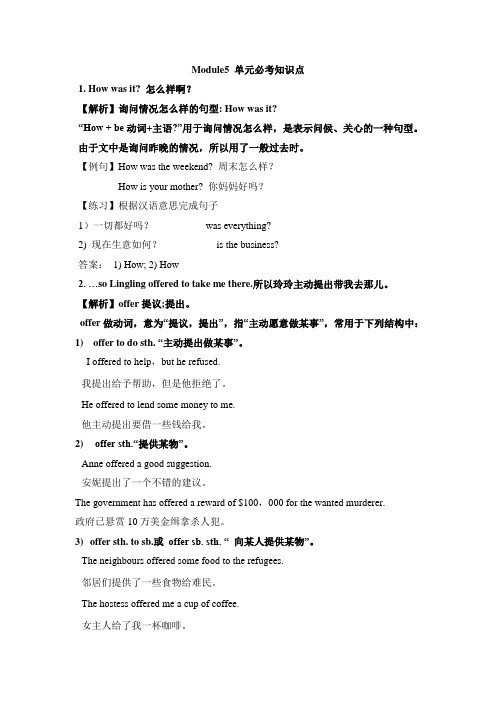
Module5 单元必考知识点1. How was it? 怎么样啊?【解析】询问情况怎么样的句型: How was it?“How + be动词+主语?”用于询问情况怎么样,是表示问候、关心的一种句型。
由于文中是询问昨晚的情况,所以用了一般过去时。
【例句】How was the weekend? 周末怎么样?How is your mother? 你妈妈好吗?【练习】根据汉语意思完成句子1)一切都好吗?_________ was everything?2) 现在生意如何?_________ is the business?答案:1) How; 2) How2. …so Lingling offered to take me there.所以玲玲主动提出带我去那儿。
【解析】offer提议;提出。
offer做动词,意为“提议,提出”,指“主动愿意做某事”,常用于下列结构中:1)offer to do sth. “主动提出做某事”。
I offered to help,but he refused.我提出给予帮助,但是他拒绝了。
He offered to lend some money to me.他主动提出要借一些钱给我。
2)offer sth.“提供某物”。
Anne offered a good suggestion.安妮提出了一个不错的建议。
The government has offered a reward of $100,000 for the wanted murderer.政府已悬赏10万美金缉拿杀人犯。
3)offer sth. to sb.或offer sb. sth. “ 向某人提供某物”。
The neighbours offered some food to the refugees.邻居们提供了一些食物给难民。
The hostess offered me a cup of coffee.女主人给了我一杯咖啡。
八年级上册英语外研版m5知识点
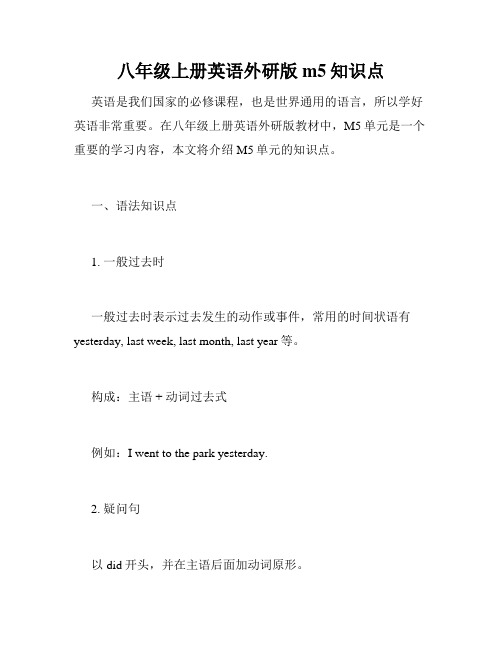
八年级上册英语外研版m5知识点英语是我们国家的必修课程,也是世界通用的语言,所以学好英语非常重要。
在八年级上册英语外研版教材中,M5单元是一个重要的学习内容,本文将介绍M5单元的知识点。
一、语法知识点1. 一般过去时一般过去时表示过去发生的动作或事件,常用的时间状语有yesterday, last week, last month, last year等。
构成:主语 + 动词过去式例如:I went to the park yesterday.2. 疑问句以did开头,并在主语后面加动词原形。
例如:Did you eat breakfast this morning?3. 物主代词物主代词用于表示所有人的所有格。
例如:my, your, his, her, its, our, their二、词汇知识点1. 动词短语动词短语是由一个主动词和一个或多个助动词组成的,常用于表示情态、完成时态等。
例如:can do, must go, have been, will be等。
2. 名词复数英语中名词复数的构成方式有规则的和不规则的两种。
规则复数的构成:在名词后加s或es。
例如: book – books, apple – apples.不规则复数的构成:不遵守任何规律。
例如:child – children, tooth – teeth等。
3. 形容词比较级和最高级形容词比较级用于表示两者之间的比较,最高级用于表示三者或三者以上的比较。
例如:small – smaller – smallest, busy – busier – busiest.三、语言技能知识点1. 听力技能听力技能是英语学习中很重要的语言技能之一,能够提高的方法有:(1)多听英语,加强对语音、语调的感知。
(2)选择合适难度的听力材料,逐渐增加听力难度。
(3)注意听语音语调和单词重音。
(4)注意上下文的语言东西和主题思路,带着问题去听。
初二英语上册(外研版)Module5 重点知识点

Module5 Lao She TeahouseUnit 1 I wanted to see the Beijing Opera.一.重点单词1. actress n. 女演员→(对应词)actor n. 男演员2. teahouse n. (尤指亚洲的)茶馆3. offer v. 提议;提出4. end n. (时间的)最后一段,末尾v. 结束二.重点短语1. how long 多久2. in the end 最后;终于3. no idea 不知道4. be famous for 因……而著名5. would like 想要6. offer to do sth. 主动提出做某事7. hope to do sth. 希望做某事三.重点语法1.offer的用法①offer sth. 提供某物例:She offered a book. 她提供了一本书。
①offer sb. sth. /offer sth. to sb. (主动)给某人提供某物例:He offered me an apple/offered an apple to me.他主动给了我一个苹果。
①offer to do sth. (主动)提出做某事例:Lingling offered to drive me home.玲玲主动提出开车送我回家。
2.in the end的用法in the end的意思是“最后”= finally = at last例:In the end,we got to the small village.最后,我们到达了那个小山村。
3.以下句子是含有动词不定式的句子I wanted to see the Beijing Opera, so Lingling offered to take me there.No, it was difficult to understand the words.We only planned to watch for an hour.I hope to understand more next time.Do you often go to see the Beijing Opera, Lingling?I wanted to take Betty to the teahouse because it’s famous.(1)动词不定式的形式动词不定式的基本形式是“to+动词原形”,常写作to do(有时to可以省略),否定形式为not to do。
最新外研版英语8年级上Module 5 知识点清单笔记)

Module 5单词讲解1. actress n. 女演员—actor 男演员动词:act 表演; 行动e.g. Jackie Chan is a famous actor.Do you know many actresses?actor —actresswaiter —waitresshost —hostess2. teahouse 茶馆at the teahouse 在茶馆3. offer v. 提供;主动提出词组:offer sb. sth. =offer sth. to sb. 给某人提供某物e.g. He offered me a book. =He offered a book to me.offer to do sth. 主动提出做某事e.g. Lingling offered to drive me homeoffer n. 提议;(短期)减价特价;录取通知书43.【2014河南】—You may go to Milan for a free trip.—It’s a very kind _______, but I really can’t accept it.A. excuseB. offerC. promiseD. decision44.(2015湖北武汉)—Any special ________ in this shopping mall now?—Sure, we have the latest e-products on sale.A. offerB. priceC. brandD. service4. end n. (时间的)最后一段;末尾v. 结束in the end 最后=at last =finallye.g. In the end they passed the exam.at the end of + 时间/地点在…尽头/末端e.g. There is a shop at the end of the street.at the end of last termby the end of 到…为止【过去完成时had done】e.g. We had learnt about 1000 words by the end of last term.5. no idea 不知道I have no idea. 我不知道=I don’t know.—Do you know what time the last train is? —No idea.6. show v. 展示,展出n. 演出,表演词组:show sb. sth. =show sth. to sb. 出示/给某人看某物e.g. Can you show me your picture? 你可以把你的照片给我看看嘛?=Can you show your picture to me?show sb. around sp. =take sb. around sp. 领某人参观某地e.g. I will show you around my factory. 我将领你参观我的工厂be on show 展览e.g. There is a flower show in the park.7. common n. adj. 普通的,一般的common life 普通的生活8. 基变序,有规律,词尾加上th一二三,特殊记,单词td作结尾first , second, third八减t, 九去e, f来把ve替eighth ninth fifth twelfth单词ty作结尾,一定把y变ie twenty—twentieth若是碰到几十几,只变个位就可以thirty-five —thirty-fifty四,十四,四十four —fourth fourteen—fourteenth forty—fortieth九,十九,九十nine—ninth nineteen—nineteenth ninety —ninetieth 9. describe v. 描述—description n. 描写【书写】词组:decribe… as 把……描述为e.g. They describe a language as a system.10. society n. 社会in Chinese society 在中国社会11. college n. 大学go to college 上大学12. name n. 名字name v. 给…命名给……取名e.g. He named his son Tom.※名词named/called 一个被叫做……a place named Daqing a girl called Alice13. if 如果,若;是否如果(条件状语从句)—主将从现是否(宾语从句)I don’t know if it will rain tomorrow.—What are you doing tomorrow, Jane?—I’ll go bike riding if it ______. I like riding on rainy days. 【2013丹东】A. doesn’t rain B is cloudy C. is snowy D. rains答案:D课文讲解:Unit 11. see the traditional Beijing Opera 看京剧watch an opera 看戏剧2. The opera is difficult to understand. 戏剧很难理解。
外研版八年级英语上册M5知识点

Module 5 知识点归纳一.短语强记drink tea 喝茶,in the end最后,main thing主要的事情,next time下次,no idea 不知道,be famous for因……而闻名,would like想要,one of… ……之一,common people普通人,the end of the nineteenth century 19世纪末,send…to 把……送到……,return to回到……,be named被命名为,the People’s Artist人民艺术家,magic shows魔术表演,give a warm welcome to 热烈欢迎……,take place 发生,think about考虑,at the end of 在……末尾,have a great time过得愉快,at the same time同时二.知识点解析1. actress n. 女演员actor n.男演员2.want to do sth是主语某人自己想要做某事;want sb to do sth是主语某人想要让另外一人做某事want to______the Beijing Opera想去看京剧3.offer① offer sth. 主动提供某物,offer_____ ______提供一些建议② offer sb. sth.=offer sth. to sb. 给某人提供某物,offer a good job___him给他提供一份好工作③ offer to do sth. 主动提出做某事,offer ___ ____ me主动帮助我4.hope to do sth.希望做某事5.agree to do sth.同意做某事6.take…to…带某人或某物去某地,后接地点副词,to可以省略。
take me there7.in the end 最后,终于,相当于finally或at lastat the end of …在…的末尾,在…的尽头, at the _____ of the road8.No idea=I have no idea./ I don’t know.9.be famous for 因……闻名,Lao She is famous ______his play teahouse.be famous as 作为……而闻名, Lao She is famous ______a great writer.10.show①“展示;显示;给……看” show sb. sth.或show sth. to sb.给某人看或者展示某物,show me a book= show a book____me,注意:“show it(them) to sb.”结构。
初中英语 外研版八年级上册Module5 知识点+习题
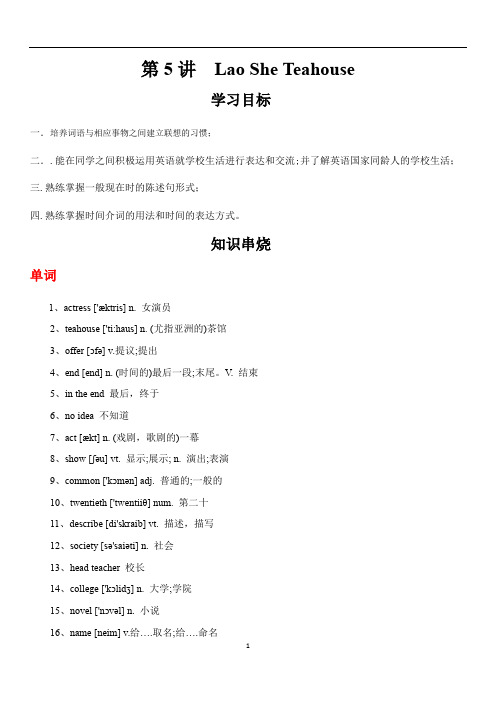
第5讲Lao She Teahouse学习目标一.培养词语与相应事物之间建立联想的习惯;二..能在同学之间积极运用英语就学校生活进行表达和交流;并了解英语国家同龄人的学校生活;三.熟练掌握一般现在时的陈述句形式;四.熟练掌握时间介词的用法和时间的表达方式。
知识串烧单词1、actress ['æktris] n. 女演员2、teahouse ['ti:haus] n. (尤指亚洲的)茶馆3、offer [ɔfə] v.提议;提出4、end [end] n. (时间的)最后一段;末尾。
V. 结束5、in the end 最后,终于6、no idea 不知道7、act [ækt] n. (戏剧,歌剧的)一幕8、show [ʃəu] vt. 显示;展示; n. 演出;表演9、common ['kɔmən] adj. 普通的;一般的10、twentieth ['twentiiθ] num. 第二十11、describe [di'skraib] vt. 描述,描写12、society [sə'saiəti] n. 社会13、head teacher 校长14、college ['kɔlidʒ] n. 大学;学院15、novel ['nɔvəl] n. 小说16、name [neim] v.给….取名;给….命名17、if [if] conj. (表条件)如果;若18、magic ['mædʒik] adj.魔术的;戏法的课文Unit1I wanted to see the Beijing Opera.Betty:Lingling and I went to Lao She Teahouse last night.Tony:How was it?Betty:It was great!You know,I wanted to see Beijing Opera,so Lingling offered to take me there.We dran k tea and watched an opera.Tony:Did you understand the opera?Betty:No,it was difficult to understand the words.But the actors and actress were excellent.Tony:How long did you stay?Betty:We only planned to watch for an hour,but in the end,we stayed for three hours.Tony:Did you enjoyed it?Betty:Well,it was interesting---that’s the main thing.I hope to understand more next time.Tony:Do you often go to see Beijing Opera,Lingling?Lingling:No,I don’t.I wanted to take Betty to the teahouse because it’s famous.Tony:Who is Lao She?Betty:No idea.Ask Lingling.Lingling:Lao She is a great writer.He’s especially famous for his play Teahouse.Unit2It describes the changes in Chinese societyRead the passage and match the heading with the paragraphs.a)Lao She Teahouseb)The Story of Teahousec)Lao She1Teahouse is one of Lao She’s most famous plays.He wrote it in1957.The play has three acts and show s the lives of common people in China from the end of the nineteenth century to the middle of twentieth cent ury.It tells us the story of Wang Lifa and the customers of his teahouse in Beijing.It describes the changes i n Chinese society over fifty years around the beginning of the twentieth century.2Lao She was born in Beijing in1899.His mother sent him to a teacher’s school in1913.After finishing school in1918,he became a head teacher of a primary school.In1924Lao She left home and went to Engla nd.He taught Chinese at a college in London and returned to China five years later.He wrote many plays,n ovels and short stories about people’s lives,and was named“the People’s Artist”.Lao She is one of the great est Chinese writers of the twentieth century.3At Lao She Teahouse today,customers can drink tea and eat delicious Beijing food.If you like the Beiji ng Opera,traditional music or magic shows,you can enjoy them at the o She Teahouse gives a warm welcome to everyone from all over the world.语法一、动词不定时作宾语动词不定式做宾语,表明意图、希望或决定的内容。
- 1、下载文档前请自行甄别文档内容的完整性,平台不提供额外的编辑、内容补充、找答案等附加服务。
- 2、"仅部分预览"的文档,不可在线预览部分如存在完整性等问题,可反馈申请退款(可完整预览的文档不适用该条件!)。
- 3、如文档侵犯您的权益,请联系客服反馈,我们会尽快为您处理(人工客服工作时间:9:00-18:30)。
Module 5I wanted to see the Beijing Opera, so Lingling offered to take me there.我想去看京剧,所以玲玲就主动带我去那儿了。
offer V. 提议,提出1.offer to do sth. 主动做某事,动词不定式作宾语。
( ) Li Lei is very kind and he often to help me with my English after school.A.offersB. agreesC. decidesD. asks2.offer sb sth.=offer sth to sb. 提供给某人某物。
(双宾语)Mr Black is very kind and always offers his help to others.布莱克先生很善良,总是为他人提供帮助。
He me .=He me.他给我提供了一些钱。
()The little boy his seat to an old lady on the crowded bus.A.lentB. offeredC. tookD. broughtHow long did you stay?你们待了多久?How long 多长时间,用来询问时间的长短,回答常用“for+一段时间”,还可以用来询问物体的长度。
How long is the river?这条河有多长?( ) --- do the students in your school do outdoor activities every day?---At least an hour.A.How oftenB. How longC. How muchD. How farWell, it was interesting--that’s the main thing.嗯,它很有趣---那才是主要的事。
main adj.主要的mainly adv. 主要地mainly 是main 的副词形式,相当于mostly ,没有比较级和最高级形式。
用来修饰动词、形容词、副词、介词短语等。
The students in our class are mainly from poor families.我们班里的学生主要是来自于贫困家庭。
We mainly talked about the main idea of the play.我们主要讨论了话剧的主题思想。
Tea leaves are produced in the southern part of China.茶叶主要产自于中国的南方。
in the end; at the end of 和by the end ofYou’ll find a hotel at the end of the street.在这条街的尽头,你会找到一家宾馆。
He came back by the end of the meeting.在会议结束前,他回来了。
根据汉语意思完成句子,词数不限。
1.最后他找到了他的妈妈。
, he found his mum.2.在这条路的尽头有一家新超市。
There is a new supermarket the road.3.最后他们赢了比赛。
, they won the match.4.在路的尽头你可以看见一间饭店。
the road, you will find a restaurant.5.这学期末,我们会有一个考试。
this term, we will have an exam.( ) , he decided to send the sick child to hospital.A.To the endB. In the endC. At the endD. By the end hope 和wishhope to do sth. 希望做某事。
hope + that 从句希望……wish sb to do sth. 希望/祝愿某人做某事。
1.I Pairs this summer.今年夏天我希望游览巴黎。
2.They hope that China one day.他们希望能参观中国。
3.()---My parents that I can get good grades next term.---You can do it if you work hard.A.hopeB. forgetC. rememberThe play has three acts and shows the lives of common people in China from the end of the nineteenth century to the middle of the twentieth century.这个话剧有三幕,展示了从19世纪末到20世纪中期中国平民的生活。
show V. 给(某人)看,可接双宾语show sb sth. = show sth to sb.给某人看某物。
Please show us your photos.=Please show your photos to us.请给我们看一看你的照片。
Please show me your new pen.(改为同义句)=Please your new pen me.拓展:show sb around 带领某人参观……My friend showed me around the Great Wall.我的朋友带领我参观了长城。
show up 出现,露面Lao She is one of the greatest Chinese writers of the twentieth century.老舍是20世纪中国最伟大的作家之一。
one of + the + 形容词最高级+ 可数名词复数表示“最……的……之一”,作主语时,谓语动词用单数。
Miss Wang is popular in our school. 王老师是我们学校最受欢迎的老师之一。
One of my questions how to learn English well.我的问题之一是如何学好英语。
()---Do you know that China is one of countries in the world?---Yes, I do. It’s older than America.A.the oldest; veryB. old, veryC. the oldest; muchD. oldest; much The story of Teahouse takes place in Beijing.《茶馆》的故事发生在北京。
take place 发生一般指非偶然性事件的发生,多指按计划而发生的事,往往是人们乐于参与的事情。
What great changes will take place in China in a hundred years?一百年以后,中国将发生什么样的巨大变化?happen 发生指偶然事件的发生或未能预见的事情的发生,强调意外性和偶然性,主语常是事。
常见用法为sth happens to sb.How did the accident happen?事故是怎样发生的?( ) A terrible earthquake in Ya’an, Sichuan Province on April 20th, 2013.A.took placeB. happenedC. takes placeD. happensIt describes the hard life of Ah Q and makes people think about society.它描述了阿Q 的艰苦生活并让人们思考社会。
make sb do sth. 让某人做某事。
My parents always make me do my homework after dinner.我父母总是让我在晚饭后做作业。
In the 1920s, people began to translate his works into English.在20 世纪20年代,有人开始把他的作品译成英语。
translate ……into ……把...译成....Who can help me to translate the English sentence into Chinese?谁能帮我把这个英语句子译成汉语。
Please translate the English poem Chinese.A.onB. forC. intoD. atHe brought Wang Lifa to life, from a young man to an old man.他把王利发从青年到老年扮演得栩栩如生。
bring ....to life 使更生动,使苏醒Birds and flowers bring the painting to life.鸟和花使这幅画栩栩如生。
Her novels bring the boys life.A.toB. onC. atD. in拓展:bring down 降低,打倒bring back 归还,使回忆起About 15,000 people could watch a play at the same time.能同时容纳约15000名观众看戏剧。
at the same time 同时You can drink and listen to music at the same time in this restaurant.在这家饭店你可以在喝酒的同时听音乐。
On the computer you can listen to music and play computer games .A.at a timeB. at same timeC. at the same timeD. on the same timegive a warm welcome to sb. 对某人表示热烈的欢迎。
The Chinese people the guests from around the world. 中国人们对来自世界各地的客人表示热烈的欢迎。
send sb to do sth. 打发/派某人去做某事。
send sb sth.= send sth to sb. 给某人寄某物。
send sb to + 某地. 送某人去某地。
1.He his son some oil.他打发他儿子去买些酱油。
